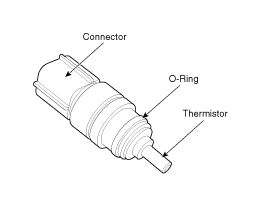 Hyundai Sonata: Engine Coolant Temperature Sensor (ECTS). Description and Operation
Hyundai Sonata: Engine Coolant Temperature Sensor (ECTS). Description and Operation
Description
Engine Coolant Temperature Sensor (ECTS) is located in the engine coolant
passage of the cylinder head for detecting the engine coolant temperature. The
ECTS uses a thermistor that changes resistance with the temperature.
The electrical resistance of the ECTS decreases as the temperature increases,
and increases as the temperature decreases. The reference +5V is supplied to
the ECTS via a resistor in the ECM. That is, the resistor in the ECM and the
thermistor in the ECTS are connected in series. When the resistance value of
the thermistor in the ECTS changes according to the engine coolant temperature,
the output voltage also changes.
During cold engine operation, the ECM increases the fuel injection duration
and controls the ignition timing using the information of engine coolant temperature
to avoid engine stalling and improve drivability.

 Intake Air Temperature Sensor (IATS). Repair procedures
Intake Air Temperature Sensor (IATS). Repair procedures
Inspection
1.
Turn the ignition switch OFF.
2.
Disconnect the IATS connector.
3.
Measure resistance between th ...
 Engine Coolant Temperature Sensor (ECTS). Specifications
Engine Coolant Temperature Sensor (ECTS). Specifications
Specification
Temperature
Resistance (kΩ)
┬░C
┬░F
-40
-40
48.14
-20
-4
...
See also:
Automatic-dimming function
Your mirror will automatically dim upon detecting glare from the vehicles traveling
behind you. The auto-dimming function can be controlled by the Dimming ON/OFF Button:
1. Pressing and hold the bu ...
Instrument Cluster. Components and Components Location
Components
...
Description and Operation
Description
The charging system includes a battery, an alternator with a built-in
regulator, and the charging indicator light and wire.
The Alternator has built-in diodes, each rectifying A ...
